
Get More Leads with Content Marketing for Your Startup
Content is the engine that drives sales, builds authority, enhances customer relationships, and helps gain loyalty in the market.
Therefore, when you invest time and energy into developing content that touches the hearts of the viewers/readers, it is pertinent to put in equal amounts of labor in marketing that content.
Content not appropriately marketed might go stale and be of no benefit to your business.
So, gear up and follow strategies to market your content online in the most results-driven and straightforward way possible.
7 Tips for Growing Your Startup Business with Content Marketing
1. Create a Blog Section on your Website
Blogs are the only way to build trust and authority in your industry. After all, blogs help you answer your customers’ queries, thus allowing you to be in their minds whenever they feel stuck.
Once you establish this relationship with your customer base, no one can pull you down.
However, it is essential to understand what kind of blog would make your business shine. Make sure you write on industry-specific topics or topics closely related to your industry.
Otherwise, you can also share the stories of your company’s stories/customers’ stories/feedback to engage the readers with a human touch.
Tools to follow:
- Use CoSchedule for writing eye-catching headlines or any free blog title generator like Thehoth to get ideas, as in the screenshot.
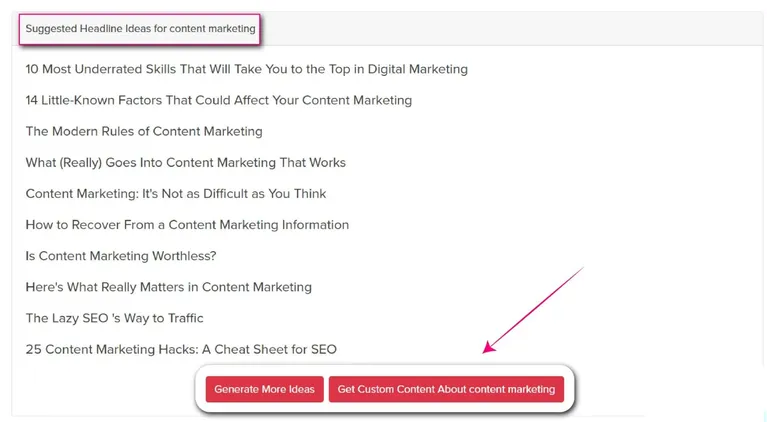
- Use Ubersuggest for keyword research— find short and long-tail keywords in a single space.
- Use Notion to prepare a list of content ideas beforehand.
2. Work on Social Media Presence
According to Statista, Social media usage is one of the most popular online activities. In 2020, over 3.6 billion people were using social media worldwide, projected to increase to almost 4.41 billion in 2025.
Your brand presence on social media plays a vital role in content marketing. You can create content with which your viewers would love to engage and build relationships.
The screenshot below shows user engagement on a startup firm’s social channels, which firms likely miss with no social presence.
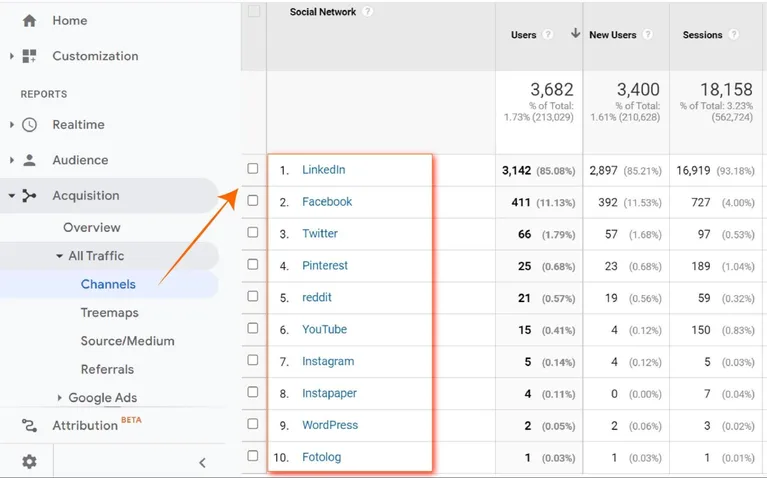
Tips to follow:
- Play with social media features, such as reels, polls, image posts, textual posts, and others, to engage with the audience.
- Build a content calendar and stick to it. Develop content regularly and post it on fixed days and times to increase anticipation among the audience
- Measure results using social media analytic tools such as Sprout Social, BuzzSumo, and Google Analytics.
3. Encourage User-Generated Content
User-generated content relates to your brand produced by anyone other than your business officials.
However, UGC plays a massive role in bringing customers to your doorstep.
UGC provides legitimate reviews/feedback/product descriptions compared to advertisements which are often exaggerated and photoshopped versions of authentic products/services.
Tips to follow:
- Organize hashtag contests with exciting prizes to grab the audience's attention and ask them to upload their reviews/feedback on your products. This would bring attention to your brand and help you attract potential customers in less time. Here’s an example that asks users to engage and also invite their connections to get a chance to win $50.
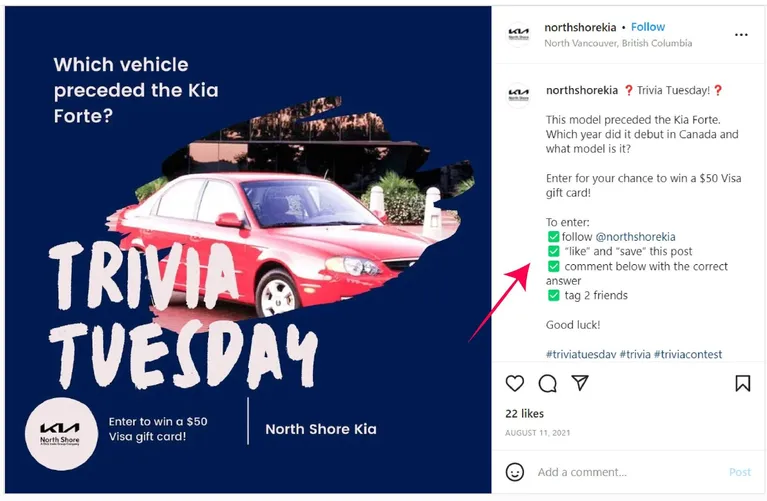
- Video content is a great way to boost your audience, thus asking them to create videos sharing their experiences after taking your services/using your products.
- You can also collaborate with a user and work on a podcast/youtube video or any other forum to attract your audience.
Read: Important of User-Generated Content on eCommerce
4. Follow Industry Hot Topics
Keeping up with the ever-changing trends might seem tricky to many, but it is the reality of the online business.
To stay afloat in this industry, you must build unique content on the day's trending topics.
You can do that without feeling pressured by posting one trendy piece of content every other week. This would help you analyze what others in your industry are doing and what you can do to make your brand stand out.
Startups can find the trending topics from Google trends, social media, competitor sites, or SEO tools.

Due to the constraint on startup budgets and resources, it is understandable that you might find it challenging to get hold of all the trends with a small team.
However, if you concentrate on quality rather than quantity, you can come out with flying colors.
Tips to follow:
- Give a personalized touch to even the trends that you participate in. Be it reels or stories, add the touch of your brand to it.
- Always participate in trends that are related to your niche.
- Refrain from political or opinionated commentary on any hot topics.
5. Experiment with Different Forms of Content
Experimenting is the key to mastering the personalized journey of content marketing.
Every startup is unique in itself and so are its content marketing strategies. So, when you start creating content and marketing it, ensure you do so in various mediums. The audience interests are diversified, and startups must unearth the strategies or various content forms to connect with them.
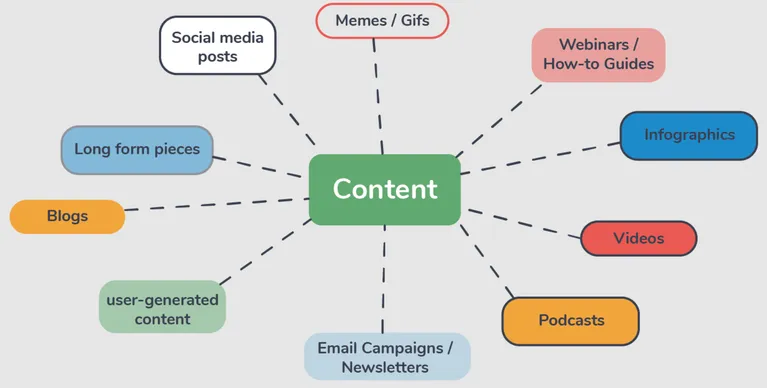
Play with videos, short-form content, long-form content, reels, stories, images, carousels, etc.
Tips to follow:
- Ask your audience what they enjoy the most. Let your audience use their voice.
- Produce content that adds value to your overall startup business so that you can expand your business reach.
- Go live to interact with your audience and ask them to read/watch/share your latest content while conversing with them.
6. Collaborate And Build Valuable Connections
As a startup, you must establish relationships with other creators and businesses in your industry.
Therefore, the best way to form connections and gain trust as a newbie is by collaborating with people who have worked in the industry for some time.
You can pitch ideas for collaborations, send personalized emails, and contact the founders personally to create innovative content for your audience.
The below screenshot shows an email template to collaborate with industry leaders for content creation.

This way, you can market your content and ideas more holistically.
Tips to follow:
- Be clear with your expectations, cause, and goal when you start to collaborate with people.
- Ensure that your content adheres to the needs and values of the person/brand you are collaborating with.
- Encourage your team members to develop exciting and engaging ideas to collaborate regularly.
7. Repurpose Your Content
Hundreds of startup owners give up on content creation and marketing because they think they cannot produce new content.
However, this is something every creator on the internet faces in the fast-paced world.
Therefore, there is an art of repurposing content that can be your savior when you have no new idea to share with your audience.
Besides, all the prominent creators repurpose their content and share them on different social media platforms using different styles, formats, and colors.
Doing so is that not all your customers/audience follow you on every social media platform.
Or it could be that not everyone is active on all the social media platforms.
Therefore, repurpose and use the content as many times as possible when producing content.
Example to follow:
Gary Vaynerchuk is a brilliant example to study the idea of repurposing content.
He produces YouTube videos and repurposes that content to post on other social media platforms such as Instagram, LinkedIn, and Twitter to attract viewers across platforms.
And below screenshot shows how effectively he repurposes his old video to create increased content engagement.
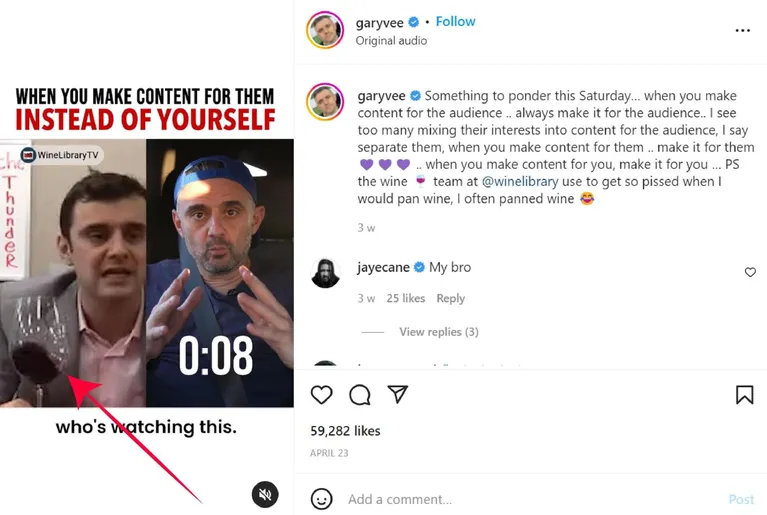
Content Marketing for Startups - FAQs
Q1: What Is The Best Content Marketing Strategy For Startups?
The best strategy is to work incessantly to produce content worth reading and sharing. It is essential to maintain consistency, play with content formats, and pitch ideas to collaborate and guest post.
Q2: What Is The Hardest Part About Content Marketing For Startups?
As startups have limited funds and resources, it is difficult for them to invest their time and energy in inconsistent content creation and marketing.
Q3: How Do You Find Ideas For Content Marketing?
The best way to find ideas is by consuming great content. Read/watch/listen to content creators working day in and out in your industry and other industries to get a knack for content creation.
Q4: What Are The Don’ts Of Content Marketing?
- Sharing uninteresting, cliche content.
- Not engaging with the audience/ignoring their needs.
- Not building relationships with fellow startups and businesses.
- Posting on and off on social media and websites— inconsistent content generation.
Key Takeaways
- Create a blog section on your website and produce valuable content for your audience.
- Work on social media presence by engaging with the audience and fellow businesses as much as possible.
- Encourage user-generated content to establish trust and authority.
- Follow industry hot topics by adding a personal touch to attract the audience.
- Experiment with different forms of content to see what your audience prefers the most.
- Collaborate and build valuable connections either by pitching ideas or by supporting others.
- Repurpose your content to attract viewers across platforms.
ABOUT THE AUTHOR:
Brice Decker

Brice has been handling marketing projects for more than 12 years and he is providing consulting services on SEO, Social Media and PPC. He has a huge expertise in working at large corporations including Accenture Interactive & PwC Digital Services.
ABOUT THE AUTHOR:
Brice Decker

Brice has been handling marketing projects for more than 12 years and he is providing consulting services on SEO, Social Media and PPC. He has a huge expertise in working at large corporations including Accenture Interactive & PwC Digital Services.
Related Post
How to Rebrand Your Business Without Losing SEO?